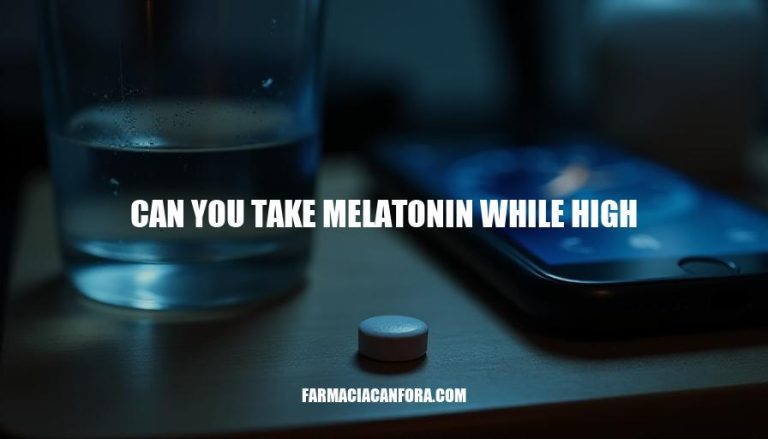


Melatonin is a hormone that helps us sleep. Some people take it as a supplement to get better rest. Cannabis can also help you relax and fall asleep.
But when we mix these two, things get complicated. We need to know how they interact with each other and our bodies. This matters because both melatonin and cannabis can affect our brain and body rhythms.
Knowing this helps us make smart choices about using them together and avoid any problems.
Melatonin is a natural hormone produced mainly by the pineal gland in the brain. It plays a crucial role in regulating the body’s circadian rhythm, which is the internal clock that dictates sleep-wake cycles. Melatonin production increases in response to darkness, helping signal the body that it’s time to sleep, and decreases in light, signaling wakefulness.
Common uses of melatonin include treating insomnia, adjusting sleep schedules for shift workers, and alleviating jet lag.
It’s also used to manage sleep disorders in individuals who are blind and to potentially reduce symptoms of seasonal depression.
Regarding the question “can you take melatonin while high,” it’s generally not recommended to mix melatonin with substances like cannabis or alcohol, as both can cause drowsiness and combining them may lead to excessive sedation or other adverse effects. It’s best to consult with a healthcare provider before taking melatonin if you’ve consumed these substances.
Being ‘high’ generally refers to an altered state of consciousness induced by the use of certain substances. This state can vary significantly depending on the substance, individual, and context.
Substances That Can Cause This State:
Cannabis: Known for its psychoactive effects, cannabis can induce relaxation, altered sensory perceptions, euphoria, and increased appetite.
Alcohol: Though socially accepted, alcohol can lead to impaired judgment, decreased inhibitions, and sometimes aggressive behavior.
Hallucinogens: Substances like LSD, psilocybin mushrooms, and peyote can cause profound changes in perception, including visual and auditory hallucinations, altered sense of time, and intense emotional experiences.
Stimulants: Drugs such as cocaine and methamphetamine increase alertness, energy, and confidence, but can also cause anxiety and paranoia.
Opioids: Drugs like heroin and prescription painkillers produce euphoria and pain relief but are highly addictive and dangerous.
Inhalants: Substances like glue, paint thinners, and nitrous oxide can cause dizziness, euphoria, and hallucinations, but are extremely harmful to health.
Typical Effects:
Euphoria: A feeling of intense happiness or well-being.
Altered Perceptions: Changes in how one perceives time, space, and sensory inputs.
Impaired Coordination and Judgment: Difficulty in physical movements and decision-making processes.
Relaxation or Sedation: A sense of calmness or sleepiness.
Anxiety or Paranoia: Feelings of fear or unease, which can be heightened in some individuals.
Regarding the keyword ‘can you take melatonin while high’: The combination of melatonin, a hormone used to regulate sleep, with substances that alter consciousness is not well-studied. It’s generally advisable to consult a healthcare professional before mixing substances, especially those that can affect your mental state and overall health.
Can you take melatonin while high? It’s generally not recommended to mix melatonin with substances that cause a high, such as alcohol, cannabis, or other psychoactive drugs. Combining melatonin with these substances can increase the risk of drowsiness, dizziness, and impaired motor coordination.
This can be particularly dangerous if you need to drive or operate machinery. Additionally, melatonin can interact with medications that cause drowsiness, like benzodiazepines and opioids, potentially leading to excessive sedation.
It’s always best to consult with a healthcare provider before combining melatonin with any substances, especially if you have underlying health conditions or are taking other medications.
A systematic review and meta-analysis on the safety of higher doses of melatonin in adults found that while melatonin is commonly used for sleep and jetlag at low doses, there is less documentation on the safety of higher doses. The review included 79 studies with a total of 3861 participants. It was found that higher doses of melatonin did not cause a detectable increase in serious adverse events or withdrawals due to adverse events, but did appear to increase the risk of adverse events such as drowsiness, headache, and dizziness.
Another review article discussed the emerging science and clinical uses of melatonin, highlighting its role as a potent antioxidant, immune-active agent, and mitochondrial regulator.
The article also raised concerns about the safety of higher doses, long-term use, and application in certain populations.
These findings suggest that while melatonin can be safely used at low doses for sleep and jetlag, caution should be exercised with higher doses due to potential adverse effects.
The question “can you take melatonin while high” underscores the necessity of consulting healthcare professionals before combining any substances. The effects of melatonin on the body can be complex, and interactions with other substances, especially those that alter mental state, are unpredictable and potentially harmful. Only a healthcare provider can offer the appropriate guidance to ensure your safety and well-being.
Melatonin is a hormone that regulates sleep-wake cycles, but combining it with substances like cannabis or alcohol can lead to excessive sedation or other adverse effects.
It’s generally not recommended to mix melatonin with substances that cause a high, as this can increase the risk of drowsiness, dizziness, and impaired motor coordination. A healthcare provider should be consulted before taking melatonin if you’ve consumed these substances.
Melatonin is commonly used for sleep and jetlag at low doses, but higher doses may increase the risk of adverse events like drowsiness, headache, and dizziness. Caution should be exercised with higher doses due to potential adverse effects.
It’s essential to consult a healthcare professional before combining any substances, especially those that alter mental state, to ensure safety and well-being.